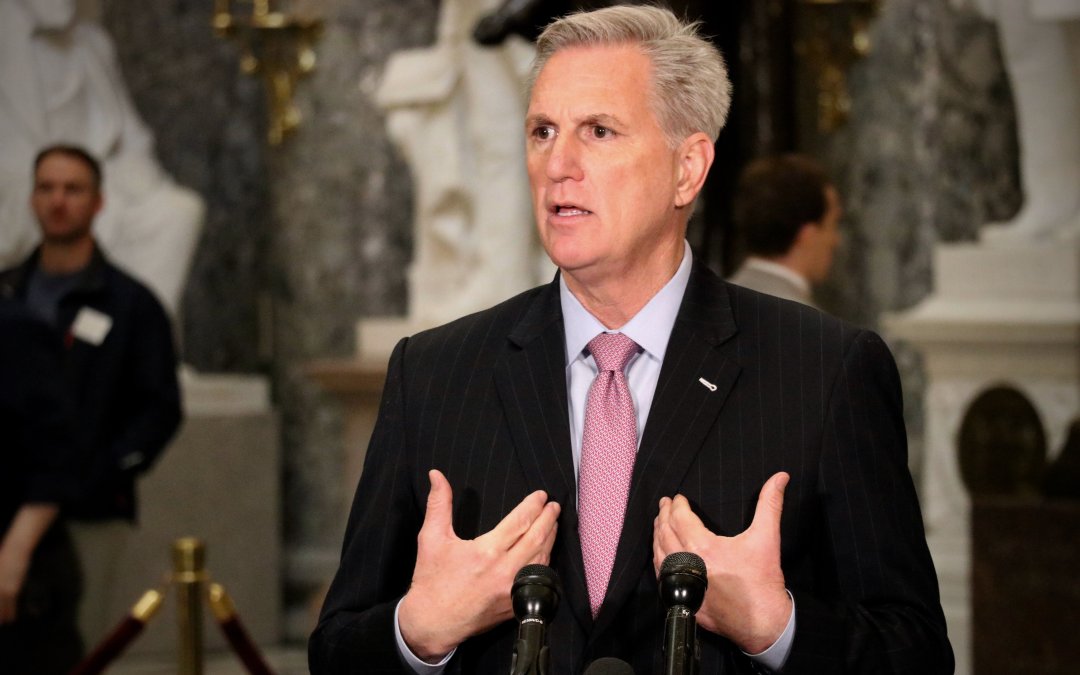WASHINGTON –– As Democrats and Republicans prepare to spar over the debt ceiling, a quieter debate on scaling back defense spending is brewing within the Republican Party.
The prospect of defense cuts started during Kevin McCarthy’s (R-Calif.) bid for speaker of the House: In an effort to gain more votes, McCarthy struck a deal with conservatives to keep discretionary spending at fiscal year 2022 levels, which would translate to a $75 billion cut to the defense budget.
Even though the deal does not specifically mention defense, some Republicans are hoping to pare down the Pentagon’s budget by focusing on non-military expenses as part of a larger effort to cut the national debt. The issue reemerged last week, when President Joe Biden released his budget proposal and asked for the largest Pentagon budget in history.
Defense accounts for nearly half of the federal government’s discretionary spending each year, making it an easy target for cuts. But already, conservative lawmakers are pushing back, calling Biden’s proposal on defense “woefully inadequate.”
House Armed Services Chair Rep. Mike Rogers (R-Ala.) adamantly opposes any legislation that would lower the Pentagon’s budget.
“The defense budget is not going to see a $75 billion cut, and I would never support anything that resulted in a cut to defense spending,” Rogers told Medill News Service.
He said that he did not believe the House would ever adopt legislation with such large cuts to the Pentagon. A proposal for broad cuts is not expected to make it through the Senate, which remains in Democratic control and is more likely to support Biden’s request for $842 billion for the defense budget.
The House Freedom Caucus recently released its own plan to address the national debt, which calls on keeping the defense budget flat rather than increasing it.
However, the House Freedom Caucus acknowledged that it wanted to see cuts in some areas of the Pentagon’s budget. It cited eliminating “woke” programs –– such as efforts to diversify the military and use alternative fuel options –– from the military.
“We need more lethality and less wokeness at the Pentagon,” Rep. Chip Roy (R-Texas) said at a news conference on Friday. Even GOP hawks like Rogers have spoken out in support of cutting such programs.
The House Freedom Caucus’ proposal has the backing of the Heritage Foundation, a conservative think tank, and its president, Kevin Roberts, recently touted the plan for its focus on policy.
“We have to make these kinds of changes in our medium-term and long-term budgets in order to have any hope of ever having a balanced budget,” Roberts said.
Some Republicans, like Rep. Marjorie Taylor Greene (R-Ga.), have also called for the U.S. to stop sending aid to Ukraine. Last year, the Pentagon spent $62.3 billion on Ukraine, and Biden promised nearly half a billion more dollars during his surprise trip to Kyiv in February.
“What’s happened in Ukraine is terrible, but we have some serious problems here. We’re broke. We cannot afford another foreign war, especially with ignoring the issues at the border,” Greene told Medill News Service.
But for other GOP members like Rep. Tony Gonzales (R-Texas), Russia’s aggression in Ukraine stands as his basis for not cutting the defense budget.
“This has a proposed billions of dollars cut to defense, which I think is a horrible idea when you have [an] aggressive Russia in Ukraine, you have a growing threat of China in the Pacific,” Gonzales told CBS’s “Face the Nation” in January.
It’s unclear whether members in districts that rely on defense spending would support cuts to the Pentagon. Defense contractors, military bases and munitions makers are often large employers in various other states, including those with House Freedom Caucus members.
Republican voters have for years prioritized military spending: In fact, a 2023 survey by Pew Research Center found that 65% of people who are Republican or lean Republican believe that Biden and Congress should look to “defending against terrorism” this year.
Despite this, Republicans do not believe that military cuts would hurt the party’s performance in the 2024 elections.
“The average conservative voter who loves a strong Defense Department understands that the only way to sustain our military strength is to force these conversations about strategy and financial efficiencies that, frankly, political cowardice in D.C. has been an obstacle to up to this point,” Roberts said.
The House GOP members might find some support across the aisle, though, as some House progressives have indicated that they’d be open to working with Republicans to pare the Pentagon’s budget.
“There are places I may actually agree with Republicans on defense cuts. I think it is absurd we are going to have almost a trillion dollar defense budget,” Rep. Ro Khanna (D-Calif.) told “Fox News Sunday” in February.
Rep. Alexandria Ocasio-Cortez (D-N.Y.), who has been critical of large defense spending in the past, echoed Khanna’s sentiment, telling Medill News Service that she would “certainly support leveling out defense spending.”

